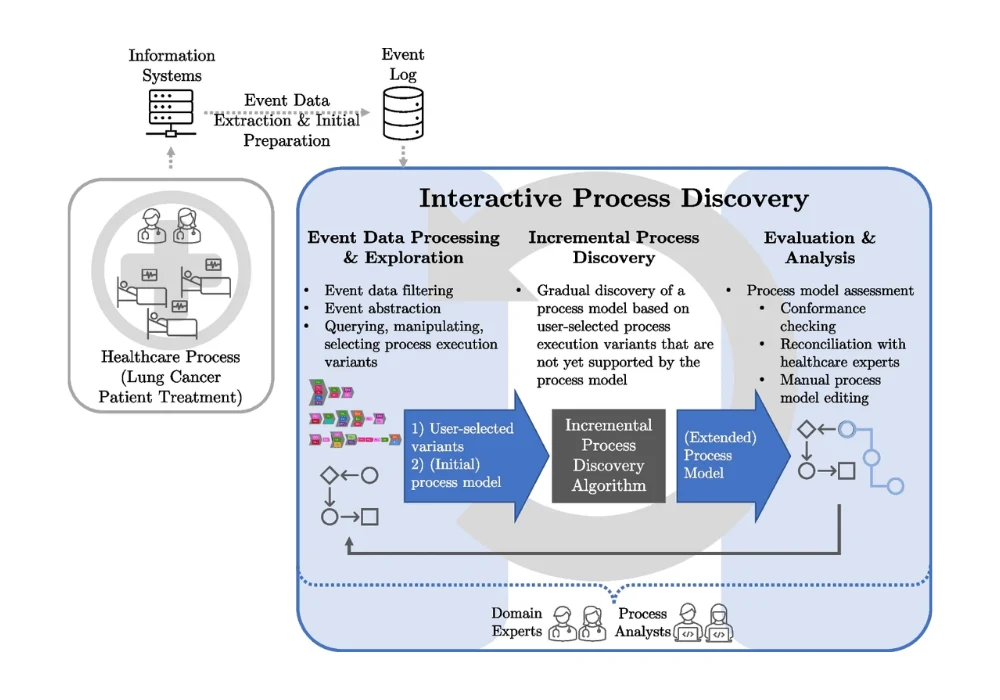Healthcare organisations must enhance care quality and effectiveness while managing costs. Streamlining operational processes reduces waiting times, minimises delays, optimises resource allocation, and improves patient outcomes. Digitalisation in healthcare allows for data-driven analysis of processes, integrating technologies such as electronic health records, blockchain, IoT, eHealth, and telemedicine, which facilitate extensive data collection. This data enables process mining, providing insights to optimise performance, identify anomalies, and improve resource allocations.
Despite its potential, applying process mining in healthcare presents challenges due to high process variability and poor data quality. Healthcare processes are complex and knowledge-intensive, with significant variability due to patient differences, treatment responses, and professional experience. Additionally, data quality issues, such as missing or incorrect timestamps, often result from excessive workload, inadequate training, and manual recording errors, impacting the reliability of process mining techniques.
Incorporating domain experts in process mining analysis has gained research interest. Traditional automated process mining struggles with low-quality event logs and does not effectively leverage domain knowledge. Consequently, new interactive process discovery approaches have emerged, combining domain knowledge and event data to improve process modelling. This hybrid intelligence approach is particularly beneficial in healthcare, where physicians' domain knowledge is crucial.
This study, recently published in the Journal of Healthcare Informatics Research, examines the effectiveness of interactive process mining techniques, particularly incremental process discovery, in analysing complex healthcare processes. The study identifies best practices and challenges by analysing lung cancer treatment event logs using the open-source tool Cortado, demonstrating how domain knowledge can be integrated into process discovery to address variability and complexity. This approach provides critical advances over traditional techniques, enabling a better understanding and modelling of healthcare processes.
Evaluating Incremental Process Discovery for Lung Cancer Treatment
The research aimed to evaluate incremental process discovery techniques for analysing complex, knowledge-intensive healthcare processes, particularly lung cancer treatments. The goal was to develop a robust normative process model by integrating healthcare professionals' expertise with detailed event data. The study was conducted at a medium-sized public hospital in Italy, using data on lung cancer treatments administered over a year.
Lung cancer treatment involves multidisciplinary collaboration and various diagnostic and therapeutic activities. The research methodology included two main phases: event data extraction and initial preparation, followed by interactive process discovery using the open-source tool Cortado.
Data were collected from various hospital information systems, merged, cleaned, and prepared to form a coherent event log.
Interactive Process Discovery:
- Event Data Processing and Exploration: Variants of the treatment process were explored and selected using Cortado's visualisations and querying features.
- Incremental Process Discovery: The process model was gradually built by integrating selected variants, with guidance from the medical team to refine and edit the model based on domain knowledge.
- Evaluation and Analysis: The model was evaluated using conformance-checking techniques and further refined through iterative feedback from the medical team.
The study involved continuous collaboration with a multidisciplinary medical team, including the head of thoracic surgery, an oncologist, and specialists from the pneumology department. Two key meetings were held with the medical team to contextualise the research and gather feedback on the process discovery approach. The study highlighted the importance of integrating domain knowledge to manage the variability and complexity of healthcare processes, providing critical insights and improvements over traditional automated techniques. The cyclic approach allowed for continuous refinement and validation of the process model, ensuring its accuracy and relevance to real-world treatment scenarios.
A cyclic rather than sequential approach to process discovery
Domain experts are crucial for data-driven process modelling projects, as they add essential tacit details and correct dataset errors. They play a key role in the Event Data Processing and Exploration phase, advising on data filtering and manipulation, and in the Incremental Process Discovery phase, ensuring models comply with clinical guidelines. This involvement helps create accurate, evidence-based process models.
Data exploration and manipulation must be integral to the process discovery phase, as many issues in event logs require domain knowledge to resolve. Cortado's focus on variants aids domain experts in understanding event data behaviour and facilitates communication. The study highlights the necessity of a cyclic rather than sequential approach to process discovery, allowing for continuous improvement.
Incremental process discovery is more effective than automated techniques in producing accurate, guideline-compliant models, especially with poor data quality. However, these techniques require knowledge of process mining and modelling languages, necessitating the support of an experienced analyst.
Practical Implications and Limitations
The study shows that an incremental and interactive approach can help healthcare managers model processes effectively, addressing variability and data quality challenges. Using Cortado, organisations can quickly identify correct process variants, eliminate wrong sequences, and create comprehensible and compliant models. This approach ensures standardised, evidence-based patient care, reduces medical errors, and optimises resource allocation, contributing to cost-effectiveness and operational excellence.
The findings are context-specific and may not be generalisable to other settings. Validation was limited to a single follow-up meeting with a small group of practitioners. Future work includes a structured user study with a broader group of healthcare professionals to evaluate the approach quantitatively and explore additional insights.
This study demonstrated the effectiveness of interactive and incremental process mining techniques, combined with domain knowledge, in modelling healthcare processes. Using Cortado, the study highlighted the benefits of an integrated approach to process discovery, resulting in accurate, guideline-compliant models. This method addresses key challenges in process mining and business process management, providing empirical evidence of its effectiveness in healthcare settings.
Source & Image Credit: Journal of Healthcare Informatics Research






